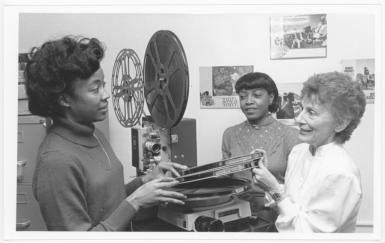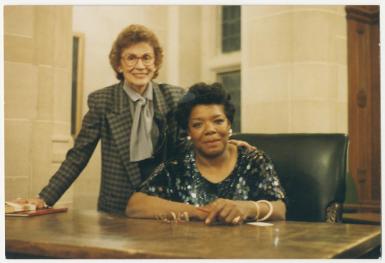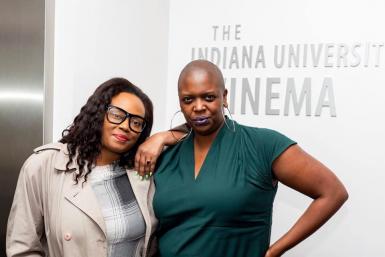Black Film Center/Archive celebrates 40th anniversary
Description of the video:
Black Film Center/Archive logo appears.
The screen counts down: 6, 5, 4, 3, 2. In the upper righthand corner, text reads: Edit Bench #2.
Old, static-y footage of Phyllis Klotman sitting for an interview.
Interviewer: Our feature interview guest this week is Dr. Phyllis Klotman, a professor of Afro-American studies at Indiana University in Bloomington. Dr. Klotman is director of the Black Film Center.
Music begins.
Interviewer: She spearheaded the first Black film workshop and Festival to be held on the campus of Indiana University We will be talking to her today about the study of Black film. Dr. Klotman, thank you very much for joining us.
Video of Deonna Weatherley filming outdoors.
Klotman: The archive idea came out of
Black and white photo of Gloria Gibson, Francis Stubbs and Dr. Phyllis Klotman looking at reels of films. It’s dated 1986.
Klotman: our attempting to find these films.
Words appear: Losing Ground.
Klotman: And when we found them,
Footage from Kathleen Collins’ 1982 film, “Losing Ground.” A woman looks out over a balcony.
Klotman: I thought, “Wouldn’t it be great
More footage from “Losing Ground.” A man waves at the woman from the ground.
Klotman: not to have to go through that problem again.
Footage from Diahann Carroll’s “Claudine.” Two women re riding a bus.
Klotman: Once we
Title screen from “Claudine.” A woman is running on a sidewalk. Text says: “Claudine.” Copyright MCMLXXIV by Third World Cinema Productions, Inc. All rights reserved.
Klotman: get them,
Closeup of a woman’s face. Text says: Claudine (1974) John Berry.
Klotman: we could become a center here.”
Footage from “Hair Wolf.” A woman is on the screen. Words appear: Black women BEWARE. Text in lower lefthand corner says: Hair Wolf (2018) Cariama Diallo.
Klotman: We’re right in the Middle West.
Another woman appears. Words appear: … of the HAIR WOLF. Text in lower lefthand corner says: Hair Wolf (2018) Cariama Diallo.
Klotman: We haven’t touched the coasts.
Photo of women sitting in a theater. Text in lower lefthand corner says: Once Haunted Still: Films & Conversation (2019). Pictured Nikyatu Jusu
Klotman: You know, there are people who don’t get east or west.
Movie footage. An astronaut is in space. Text in lower lefthand corner says: Afronauts (2014)– Nuotama Bodomo
Klotman: And wouldn’t it be wonderful if we had these films
Video of Deonna Weatherley filming outside.
Klotman: for research and study and also to share with the community.
Photo of Jessie Maple and Terri Francis giving a lecture. Text in lower lefthand corner says: Black Female Auteurs (2020) – Pictured Jessie Maple & Dr. Terri Francis
Klotman: And so I started writing these grant proposals
Photo of Kevin Everson and Terri Francis talking in front of a poster that says “Rough and Unequal.” Text in lower lefthand corner says: Rough & Unequal: Film Installation (2019). Pictured Kevin Everson & Dr. Terri Francis.
Klotman: and in the process,
Photo of students sitting in a classroom. Text in lower lefthand corner says: Once Haunted Still: Films & Conversations (2019).
Klotman: Tom Schwinn said,
Video of people in a classroom. Text in lower lefthand corner says: Black Film Festival Workshop (1983). Q&A with Kathleen Collins.
Klotman: “While you’re doing that, why don’t you also consider the possibility of bringing people to campus?”
Photo of a man holding up his fist to the camera. His rings spell out “LOVE.” Text in lower lefthand corner says: Do The Right Thing (1989) Spike Lee.
Klotman: And I said,
Photo of a man holding up his fist to the camera. His rings spell out “HATE.” Text in lower lefthand corner says: Do The Right Thing (1989) Spike Lee.
Klotman: ”But I don’t know these people.”
Video of a woman sitting in front of a microphone. Text in lower lefthand corner says: WIDC Panel on Black Women Filmmakers (1981/1990). Featured Camille Billops.
Klotman: And he said, “Well That’s never stopped you in
Movie footage. A woman closes a car door. Text in lower lefthand corner says: Ganja & Hess (1973)- Bill Gunn.
Klotman: the past., you know, why not see what you can do?”
Photo of students sitting in a lecture hall. Text in lower lefthand corner says: Once Haunted Still: Films & Conversation (2019).
Video of Deonna Weatherley filming outside.
Klotman: This is to us
Photo of a man smiling. Text says: Rough & Unequal Symposium (2019). Pictured Dr. Ross Gay.
Klotman: as important to know about
Photo of people sitting in a lecture hall. Caption: Spike Lee’s Filmworks – Dr. Terri Francis (2019)
Klotman: a medium that has affected
Movie still. Photo of three people leaning on each other. Caption: Daughters of the Dust (1991) – Julie Dash.
Video of Deonna Weatherley filming outside.
Klotman: so many people.
Photo of a man watching a film in a theater. Caption: Once Haunted Still: Films & Conversation (2019)
Klotman: It’s clear that visual
Movie still. A man watches a car on fire on a beach. Caption: The Burial of Kojo (2018) – Blitz the Ambassador.
Klotman: images have a tremendous impact.
A Channel 13 news reporter does a standup on IU’s campus. Caption: WTHR13 interview Rick Young & Dr. Phyllis Klotman (1980/1999).
Klotman: There is still the notion
Movie footage. Two men stare each other down.
Klotman: that Black experience
Movie still. Two women stand next to each other. Caption: Daughters of the Dust (1991) Julie Dash.
Klotman: is separate from,
Video footage of Gloria Gibson Hudson nodding and talking. Caption: Gloria Gibson Hudson IU Black Film Center Archives
Klotman: and not a part of the total American experience.
Video footage of a woman taking a drink of water. Caption: WIDC Panel on Black Women Filmmakers (1981/1990).
Klotman: That there is not that Black universality.
Video of Deonna Weatherley filming outside.
Klotman: As long as that barrier is there,
Photo of a woman watching a film in a theater. Caption: Once Haunted Still: Film & Conversation (2019)
Klotman: I think you’re going to have this kind of ebb and flow.
Music ends.
Nina Collins appears. Caption: Nina Collins – Daughter of Kathleen Collins Interviews Dr. Terris Francis (2020)
Nina Collins: Hi everyone, I’m Nina Collins. I’m a writer and an entrepreneur. I run a large community for women over 40 called the Woolfer, and I’ve known Terry Francis, the director of the Black Film Center Archive forr I guess about ten years now, maybe almost, maybe a little more. I wanted to get a sense of what she knew about my mother, what she thought of my mother. And at the time, Terry had a really, really crappy copy of “Losing Ground” on VHS, which was also what I had. And she said to me, “We need a better version of this.” She said, “When my students see this film, I mean, the thing that she said that I’ll just never forget, s Terry said, when Black female film students see this film, this movie, they cry like they’ve never seen representations of themselves. in film.
Photo of Terri Francis. Caption: Dr. Terri Francis. Director of Black Film Center/Archive (2017-Present)
Nina Collins: So tell me a little bit about what you do, Terry. Like you are a professor of film right? at Indiana. And then you also run the archive. How do those two roles intersect? What’s the difference?
Terri Francis appears on camera. Caption: Dr. Terri Francis. Director of Black Film Center/Archive (2017-Present)
Terri Francis: They’re both teaching roles based in my research in Black film history. And similarly, the Black Film Center Archive has a dual role, as a center and an archive. As an archive, we collect and preserve Black film history, the artifacts and the posters, the manuscripts, the films themselves. And as a center we generate Black film history through the conversations and research that occur and that happen when we bring curators, archivists, filmmakers, artists, students, all together into conversation with each other. I’m like Phyllis in the sense that I think about archival work as feature- making work, as culture-building work. I think about the Black film that’s out there now as the Black film of the Black film history of the future.
Music begins.
Movie footage. A man and a woman kiss and dance.
Credits roll:
Black Film/Center Archive
Founder Dr. Phyllis Klotman
Director Dr. Terri Francis
Executive Producers Terri Francis Bria McCarty Rebecca C. Stanze Deonna Weatherly
Directors Bria McCarty Deonna Weatherly
Editor Bria McCarty
Writers Yeeseon Chae Audrey B. Hood
Featured Events Rough & Unequal: Film Installation & Symposium by Kevin Everson (2019) Curated by Dr. Terri Francis & Betsy Stirratt
Once Haunted Still: Films & Conversations (2019) Curated by Dr. Terri Francis & Sarah Lasley
Filmmakers Nikya Jusu Cariama Diallo Eva Hagaman Nuotama Bodomo
Black Film Festival Workshop (1983) Q&A With Kathleen Collins Curated by Dr. Phyllis Klotman
WIDC Panel on Black Women Filmmakers (1981/1990) Moderated by Gloria Gibson Panelists Camille Billops Michelle Crenshaw Delle Chatman Zeinabu Irene Davis O. Funmilayo Makarah
IU Courses Black Female Auteurs MSCH-F 375 Spike Lee’s Filmworks MSCH-F 326 Dr. Terri Francis
Interviews 4 Thought (1983/1984) Phyllis Klotman
WTHR 13 (1980/1989) Rick Young & Dr. Phyllis Klotman
Studio Six (1981/1990) Gloria Gibson-Hudson & Jane Rhodes Produced & Hosted by Diane Ward
Virtual Zoom (2020) Nina Collins & Terri Francis Produced by Bria McCarty
Kathleen Collins Memorial – IU TV (1988) Dr. Phyllis Klotman & Kathleen Collins
Featured Films Losing Ground (1982)- Kathleen Collins Claudine (1974)- John Berry Hair Wolf (2018)-Mariama Diallo Afronauts (2014)- Nuotama Bodomo Do The Right Thing (1989)- Spike Lee Ganja & Hess (1973)- Bill Gunn Daughters of the Dust (1991)- Julie Dash The Burial of Kojo (2018)- Blitz the Ambassador Something Good Negro Kiss (1898)
Photography Alexander Kumar Chris Meyers
Music Creating a New Future Composer David Panades Garcia
Restless Boogie Composer Neville Dickie
Special Thanks IU Cinema IULMIA IU Media Collections Online Nina Collins
Website https://bfca.sitehost.iu.edu/home/
Music ends.
Phyllis Klotman appears on screen. Caption: Dr. Phyllis Klotoman Interviews Kathleen Collins (1988)
Klotman: Yeah. Do you have one last piece of advice for, for students who want to be film makers?
Kathleen Collins appears.
Kathleen Collins: Be very organized. It’s really a question of focusing so sharply that you can see from the class how many things you have to think about. Now multiply that growing on a set and then the cutting and music and all the additional things that come through the whole process. And you better like it.
Black Film Center/Archive logo appears.
Words appear: Website https://bfca.sitehost.iu.edu/home/
During the New Hollywood era in the 1980s, IU professor Phyllis Klotman noticed something concerning.

There was no shortage of talented Black filmmakers — including Charles Burnett, William Gunn and Kathleen Collins — but they were not receiving the same attention on the festival circuit or in the press as white filmmakers. In fact, they were receiving hardly any recognition at all.
This acted as a double eraser. Historical films produced by and featuring Black people were getting much less attention than their white counterparts; thus when it came time to preserve these Black films, archives did not contribute the same amount of preservation time or resources as they did with films produced by and featuring white people.
“The specific thing about film and video is that they’re organic compounds, which means that they naturally decompose,” said Amber Bertin, an archivist with the Black Film Center/Archive. “No matter what you do or how much time and effort you put into preserving them, eventually, they’re going to completely decompose and disappear. So if you’re not actively working to preserve them, that decomposition is going to become more rapid.”
Klotman recognized this immediate need, so in 1981 she founded the Black Film Center/Archive at IU.
The BFC/A celebrates its 40th anniversary this year and is the world’s first archival repository dedicated solely to the collection, preservation and study of films by and about Black people.
One of the purposes of the BFC/A is to remember cultural heritage and to confer legitimacy and value of the materials.
“Most of (the Black films) were disregarded, forgotten about and tossed away,” said Dan Hassoun, BFC/A archival assistant. “So to actually give these materials a specific space, specifically within an educational setting or institution like IU, is to confirm value on them.”
Archivists typically manage original materials and are responsible for cleaning and sustaining them for research or viewing purposes.

“Obviously, we have many materials that you can’t find anywhere else,” Bertin said. “If you study anything, it’s important to have these materials so you can conduct research with them.”
Besides being used for individual research, film archiving plays an important part in bringing movies and television to life.
“I always use the example of any sort of documentary anyone has seen or even just the nightly news,” Bertin said. “If you see a clip from an old news broadcast, the reason you’re able to see that is because of film archives and film archivists. They’ve taken that archive, put it into a vault to protect it and catalogued it in a way so that you can find that archived footage again.”
Included in the BFC/A’s vault of independent Black films is the newly re-preserved “A Question of Color” collection and “Remembering Thelma” materials, donated by filmmaker Kathe Sandler in 2010.
“(A Question of Color) is about Black people’s experiences with white supremacy as it is expressed in ideas about beauty, desirability and identity,” said Terri Francis, associate professor and director of the BFC/A. “In particular it’s how white supremacy alienates people from their own bodies. Sadly it’s never dated. Many students relate and many have their eyes opened.”
One of the BFC/A’s goals is to create initiatives that advance the multidisciplinary study of Black film and preservation of artifacts.
“The role of the BFC/A is to not just collect the objects but to collect the conversation around the objects,” Francis said. “Film archiving lays the foundation for what will be remembered in the future.”
Each BFC/A director had a hand in establishing the principles of the archive, Francis said. Klotman published numerous books, including “Struggles for Representation: African American Documentary Film and Video” and “Screenplays of the African American Experience.”

Audrey McCluskey hosted a plethora of conferences and grew the BFC/A’s interview collection, while Michael Martin remodeled the BFC/A’s newsletter into Black Camera, an internationally recognized journal. Martin also grew the BFC/A collections with the addition of the Black Filmmakers Hall of Fame Collection.
Francis has “curated multiple film series and speaker series because (she) wanted to invest in ongoing and multifaceted discussions of Black film,” she said.
As for the next 40 years, there’s still more exploration for the BFC/A to conduct, Francis said.
“Black film history is unfinished. It’s full of unknowns,” she said. “And there are always new discoveries coming up. That’s what makes the field exciting— your history has to include a certain amount of speculation.”
The BFC/A is currently only open by appointment only, but patrons can access many of the archive’s media collections online. Email Bertin at abertin@iu.edu to request an appointment.

